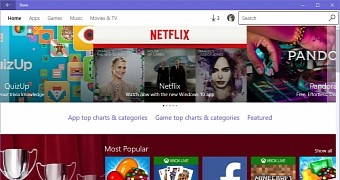Despite rumors that Microsoft could at some point bring Android apps on Windows 10 devices, the company is still pushing hard to encourage the adoption of universal apps, which allow the same code, feature lineup, and interface to be used on PCs and smartphones.
And in a new blog post today, Microsoft says that universal apps are rapidly gaining traction, as the company has recorded no more, no less than 2.5 billion visits to the store since the debut of the Windows 10 operating system on July 29, 2015.
What’s more, during the Black Friday sale, 75 percent of the customers were first-time Windows Store purchasers, according to the company itself, which also adds that, during the recently debuted 10 Cent Deals campaign, paid app purchases increased by 29 times.
One of the reasons so many people are becoming more interested in the Windows Store is the concept of universal apps, which allow users to run the same application on any Windows 10 device.
“With Windows 10, for the first time, we delivered a platform that enables developers to create one app experience that extends across all Windows 10 devices. We’re beginning to see more and more universal apps become available for Windows 10,” Microsoft explains.
Android apps on Windows 10 Mobile
While many people are hoping to see Microsoft bringing Android apps on Windows 10, especially on mobile devices, the company’s CEO Satya Nadella previously explained that more time is needed for universal apps to succeed because not all developers have already discovered the opportunity of coding for the “One Windows” platform.
While the number of clicks in the Windows Store is indeed increasing, it’s also very important to note that most of the universal apps that have launched on Windows 10 lately were already available on Windows 8, so they come from companies that were already supporting the modern platform.
In the meantime, there still are companies that refuse to bring their apps on Windows, including Snapchat and Google.

 14 DAY TRIAL //
14 DAY TRIAL //